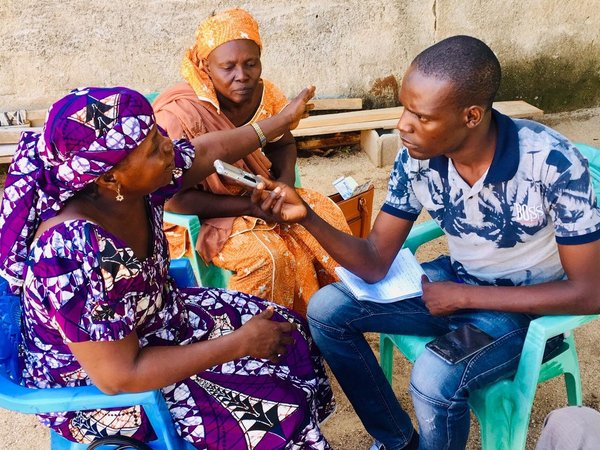 Read this article in French
Read this article in French- Share this article
- Subscribe to our newsletter
A strong voice for equal opportunities in rural Cameroon
Tell your own story – according to this motto, women entrepreneurs explain at prime time how they run their NTFP business. Too often marginalised and side-lined, a series of ten radio shows from five different stations give these women an audible platform to share their experiences with others.
"The stories of strong, rural women entrepreneurs thus receive the attention they deserve," says Désiré Tchigankong, head of the project office in Maroua, the capital of Cameroon’s Far North Region. It is the women themselves who explain to their listeners how they set up and run their business.
Most women in the region are potential entrepreneurs as it is considered "female labour" to collect and process non-timber forest products.
As a supplementary income, NTFP does usually not earn them a living. Yet, the products have great potential, and some are even world-famous. Shea Butter, Moringa and Neem have made it onto the shelves of western drugstores. Unfortunately, not yet “Made in Cameroon”.
Defying unfavourable conditions
The “business ladies”, as Tchigankong calls them, work under adverse conditions. The climate up north is arid, the security situation tense, society patriarchal, and religious institutions interpret sacred writings to the detriment of women. A lack of economic prospects aggravates the situation in a region where a staggering three-quarters of the population live in absolute poverty.
In this context, GIZ’s Forest and Environment Project (ProFE) supports micro-entrepreneurs. Five women's networks with around 2,000 members receive technical and organisational advice. At the same time, a revised legal framework and material support for mechanisation aim to improve women's economic opportunities.
Radios as change agents
From traditional role models and female entrepreneurship to environmental protection – the radio programmes have a wide variety of themes. "However, the most important focus in terms of content is the Processor Business School approach. The business ladies are experts on that,” explains Bertrand Haiwe, who has worked as a junior advisor in Maroua since 2016.
In addition to economic problems, people in the region have also been suffering from Boko Haram for years. Some 30 kilometres from the Nigerian border, the inhabitants of Mokolo were particularly often the target of Islamists. According to the International Crisis Group, the conflict has already claimed more than 2,000 lives, and at least 7,000 women and girls have experienced sexual violence from the terrorist group.
The other radio stations are less at risk, but similarly remote. Bangao is in Meskine, Radio Labar in Maga, and Bon Berger broadcasts from Kaélé. Woila FM is the only radio station in the regional capital of Maroua.
From the idea to the concept
In January 2019, Wibke Ott and her colleague Bertrand Haiwe, who are both working for the GIZ’s ProFE, developed the radio concept. In a participatory kick-off meeting, they brought together radio journalists, women's networks, women entrepreneurs, UNWOMEN and other civil society actors.
The group quickly agreed that radios were the right medium to give business women a strong voice. "Radio is the most important source of information here in the North," emphasises Haiwe.
To prepare the journalists for their work and promote interest in social justice in rural areas, Ott developed two gender trainings. “With methods from feminist pedagogy, I wanted to focus on the experience of the participants. This way, people are then more likely to be committed to social justice as a result," says Ott.
So far, the two GIZ experts have been satisfied with the results of their work. "The radios are incredibly motivating," reports Haiwe. After the pilot project, the topics must be firmly integrated into the broadcasting schedules. "We are confident that the radios will stay on and hope that GIZ will continue to use and support them," Ott sums up.
Authors:
Wibke Ott, Deutsche Gesellschaft für Internationale Zusammenarbeit (giz) GmbH, Yaoundé/Cameroon
Sven Schuppener, Deutsche Gesellschaft für Internationale Zusammenarbeit (giz)) GmbH, Jaoundé/Cameroon (sven.schuppener@giz.de)





Add a comment
Be the First to Comment